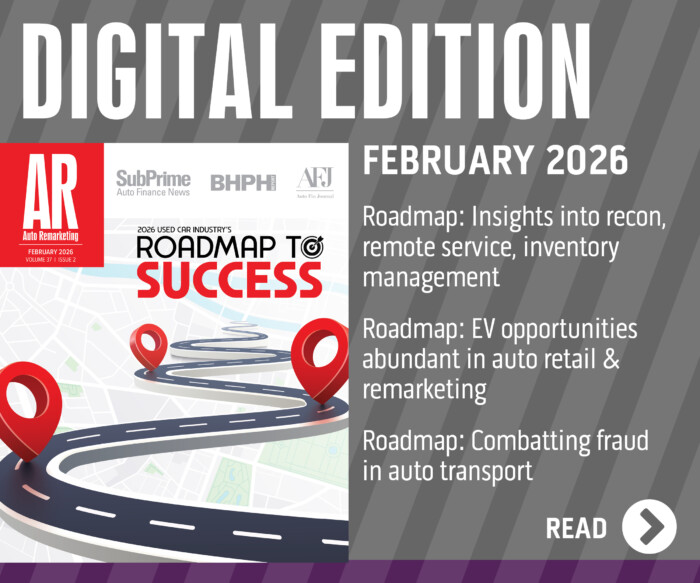COMMENTARY: Addressing your second largest business expense — approved, non-booked applications

Conecta Marketing Group founder and CEO Andres Huertas is pictured at last year’s Auto Intel Summit+National Remarketing Conference in Cary, N.C. Photo by Annie Kimura.
By subscribing, you agree to receive communications from Auto Remarketing and our partners in accordance with our Privacy Policy. We may share your information with select partners and sponsors who may contact you about their products and services. You may unsubscribe at any time.
In the competitive world of auto finance, auto lenders face a critical challenge: ensuring that approved loans successfully transition to funded bookings. Surprisingly, the second largest business expense for finance companies isn’t the cost of technology, compliance, or staffing — it’s the lost opportunity from approved loans that are never booked. This gap represents millions of dollars in unrealized revenue and significant operational inefficiencies.
The root of this issue often lies in a misalignment between lender and dealer processes, poor communication, and an inability to meet dealers’ nuanced needs. The solution? Adopting an agnostic, multichannel approach to listening to and engaging with dealers. This strategy empowers auto lenders to transform approvals into bookings, creating a win-win for all stakeholders.
Having technology that simplifies the loan onboarding process such as digital deal jackets, automatic income and identification verification is a must, but is not enough; indirect auto lenders (finance companies, credit unions, etc), need to also implement dealer relationship management systems that go beyond out-of-the-box, limited-channel, one-sided systems used to “manage” dealer relationships.
Modern dealer relationship management processes should incorporate systems that can aggregate and integrate all relevant information about the state of the relationship from the dealers point of view, including a way to capture digital communications to avoid costly surprises; in addition, the data analysis of the information should be done with a multi-departmental approach, not only in sales.
As more lenders increase their funding received from private investors and VC firms rather than lines of credit from specialized banks, the customer acquisition cost (CAC) and the approved to booked ratios (how effective is an organization getting the deals that match its programs and risk appetite) will take a more prominent part of these investment decks as they display scalable processes that go beyond only hiring sales reps to enter a market.
The hidden costs of non-booked approved applications
For finance companies, every approved application that doesn’t convert into a booked deal carries both direct and indirect costs:
Subscribe to Auto Remarketing to stay informed and stay ahead.
By subscribing, you agree to receive communications from Auto Remarketing and our partners in accordance with our Privacy Policy. We may share your information with select partners and sponsors who may contact you about their products and services. You may unsubscribe at any time.
- Wasted operational resources: The underwriting process demands significant investments in time, technology, and personnel. Non-booked loans render these efforts unproductive.
- Revenue leakage: Each approved but non-booked application represents lost interest income and missed cross-sell opportunities for other products. Lenders spent thousands of dollars in application data, so maximizing booking of approved applications makes financial sense.
- Dealer frustration: Dealers rely on lenders to efficiently close deals. Unmet expectations can weaken relationships and drive dealers to competitors. Often, lenders don’t realize a dealer is dissatisfied until it’s too late, and the relationship is lost.
Why optimizing dealer relationships is crucial to booking ratios
The methodology of hiring dealer reps/sales reps/marketing reps is just one part of the equation but without a consistent process and a robust system in place to receive centralized unfiltered direct feedback from dealers (using their preferred channel) it will be very difficult for companies to analyze and take action to improve approve to book ratios; in addition, there is a high risk of lost relationships once a particular sales person leaves the organization.
Dealers are the cornerstone of the auto lending ecosystem. They interact directly with customers and manage the complexities of financing options. Yet many indirect lenders struggle to fully understand and address dealer pain points, including:
- Complex lending processes: Lengthy, unclear procedures discourage dealers from choosing certain lenders.
- Limited communication channels: Dealers need responsive communication via their preferred platforms, such as WhatsApp, yet most lenders rely only on phone or email communications, or text messages on corporate sponsor cell phones that are not integrated with any system, leaving valuable data out.
- Misaligned incentives: If lenders’ terms and processes don’t align with dealers’ objectives, deals may fail to close and could be restructured with a competitor who then becomes the dealer’s primary partner.
A multichannel approach for better results
An agnostic, multichannel strategy—integrating across platforms and prioritizing dealer preferences—is a game-changer for lenders. Here’s how:
- Listening across channels: Utilize CRM systems, automated surveys, and direct conversations to gather unfiltered feedback. Dealers often avoid providing honest feedback, fearing it could jeopardize their relationship with the lender. Ensuring that all relevant departments, not just relationship managers, receive and act on this feedback fosters continuous improvement.
- Streamlining processes: Digital platforms that simplify application-to-booking workflows reduce friction for dealers. Borrowers also expect a transparent, efficient process.
- Personalized communication: Dealers have diverse preferences. Some may prefer phone calls, others email or chat apps like WhatsApp. For example, Hispanic-owned dealerships often favor WhatsApp for communication. If this channel isn’t formally integrated into the lender’s system, valuable relationship data may be lost.
- Data-driven adjustments: Analyze feedback and performance metrics across channels to optimize operations. When was the last time your organization used REAL-DIRECT dealer feedback to implement meaningful changes?
The financial impact of improved booking ratios
By adopting these strategies, lenders can see measurable results:
- Higher booking ratios: Boost ratios by 10-20%, translating into millions of dollars in additional revenue.
- Stronger dealer relationships: Build loyalty and long-term partnerships with dealers.
- Reduced inefficiencies: Align dealer and lender workflows for smoother operations.
Incorporating dealer feedback — directly sourced rather than relying on internal CRM notes — should be a core part of strategic planning. A lender may believe a dealer relationship is strong, but the dealer might feel otherwise, leading to missed opportunities.
A call to action
The auto finance landscape is evolving rapidly. Lenders who prioritize dealer engagement through their preferred channels will lead the charge in improving booking ratios.
There is an abundance of data, tools, and technology available to optimize fraud prevention, simplify verifications, and enhance funding. However, finance companies must also modernize how they onboard, manage, and nurture dealer relationships. By adopting an integrated, omnichannel approach and fostering open communication, lenders can maximize efficiency, strengthen partnerships, and adapt to the evolving needs of dealers and borrowers.
Taking steps to improve approved non-booked ratios offers immediate visibility and long-lasting results for both lenders and dealers.
Andrés Huertas, founder of Conecta Marketing Group LLC, brings a unique blend of expertise in loan originations and marketing strategy. His company specializes in developing tailored strategies to help lenders optimize dealer-lender relationships using cutting-edge digital technology and multicultural, integrated communication channels. For inquiries, contact Andrés at [email protected].


